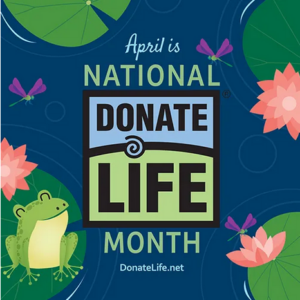 April is National Donate Life Month and raises awareness on this extremely vital topic. Currently, more than 100,000 people are waiting for an organ transplant. Sadly, there are not enough donors to meet this very important demand. Every 9 minutes, someone is added to the organ transplant list, while 17 people die each day waiting for their transplant.
April is National Donate Life Month and raises awareness on this extremely vital topic. Currently, more than 100,000 people are waiting for an organ transplant. Sadly, there are not enough donors to meet this very important demand. Every 9 minutes, someone is added to the organ transplant list, while 17 people die each day waiting for their transplant.
85% of individuals on the transplant waitlist are waiting on a kidney, making this organ in the highest demand.
Organ Donation Saves Lives
Choosing to be an organ donor is a very selfless act and gives life to a person, sometimes even after the donor’s life has ended. Organ transplants are a life-or-death reality for many people who are already dealing with the stress of managing a serious health condition. Thousands of people count on donations of eyes, tissue, and organs to save the life of a loved one.
Four Types of Organ Donations
There are four different types of organ donations. Each one serves a very specific purpose and has its process for completion.
1) Living Donation
For patients who may have a very long wait for an organ, a living donor may be the best option to increase their chances of survival. These donors can either be a loved one or close friend or even a stranger.
The need for kidney donations is so abundant that recipients often spend years on a transplant waiting list, sometimes passing away while they wait. A living donation can provide a quality organ in as little as a year. As a living donor, you can donate in several different ways, such as:
Directed donation – the most common form of a living donation, where the donor names the recipient of the transplant. The recipient can be a relative, an acquaintance, or someone unrelated to the donor who the donor has heard about.
Non-Directed Donation – A living donor will not name a specific recipient. Instead, the match depends on how compatible the donor’s organ is with patients on the transplant waiting list. The donor and recipient can meet if they choose to do so.
Kidney Paired Donation – Commonly referred to as kidney exchange, a transplant recipient has a donor to give them a kidney, but testing shows the kidney would not be a good match. In this case, living donor kidneys are swapped so each recipient receives a compatible transplant. The United Network for Organ Sharing works with transplant centers throughout the United States to search for cases where the donor in each pair is compatible with the recipient in another pair (or multiple pairs). By exchanging donors, a compatible match for both recipients can be found. This option usually includes many living donor and transplant recipient pairs.
Tissue Donation – Gestational tissue (birth tissue) can be donated after the birth of a newborn and is used to promote healing through reconstructive procedures and to treat painful wounds and burns. Donating birth tissue does not affect your health or your baby’s health. Included in birth tissue are:
- Amniotic fluid
- Amniotic membrane
- Placenta
- Tissue from the umbilical cord
- Chorionic membrane
- Umbilical veins
- Wharton’s jelly
All major surgeries pose some risk for complications. The risks for living donors include:
- Infection
- Pain
- Blood clots
- Pneumonia
- Need for blood transfusions
- Hemorrhaging
- Hernia
- Reactions related to anesthesia
- Death
2) Deceased Donation
A deceased donation includes tissue, cornea, and organ donation. Upon the death of the donor, all or part of their organ is given and transplanted in another person. To be an organ donor, oxygen and blood must flow through the organ until the organ is recovered for it to be viable. This means the person must have died under specific circumstances that resulted in a fatal brain injury such as severe head trauma, lack of oxygen to the brain, or brain swelling.
All efforts to save the donor’s life must be exhausted, and testing must be completed to confirm and declare brain death before a donation is possible.
3) Pediatric Donation
The size of the organ is crucial in pediatric transplants because children typically respond better to organs that are child-sized. There are approximately 1,900 children waiting for a transplant in the United States, with over 500 being between ages one and five years old.
There are numerous health conditions and diagnoses that require a pediatric transplant, including:
- Kidney failure or chronic kidney disease
- Conditions involving the liver
- Heart conditions
- Lung conditions such as pulmonary hypertension and cystic fibrosis
Children may also be registered as a donor, but a parent has the final decision until the child is 18 years of age.
4) Vascularized Composite Allografts (VCA) Donation
VCA donation involves transplanting multiple structures such as bone, muscle, skin, nerves, blood vessels, or connective tissue. The most common VCAs involve face and hand transplants. VCA federal regulations became effective in July 2014. People who have suffered catastrophic injury or illness can gain essential function and identity with VCA transplants. This form of therapy is distinct from a standard donor registration and requires explicit authorization.
Register to be a Donor
In 2015, the National Donate Life Registry was unveiled to make the donor registration process as easy and secure as possible. When you become an organ donor, your registration travels with you no matter where you are in the country.
You can visit the National Donate Life Registry to register to be a donor. Thousands of people are waiting to find an organ match through the organ donor registry, with even more waiting for tissue and corneal transplants. By becoming a donor, you can save more than 75 lives.
Greater Waterbury Imaging Center (GWIC) understands the delicacy of your decision to selflessly donate your organs and how important MRI screenings are during this process. We specialize in providing our patients with exceptional quality imaging services and fast results performed by our highly skilled, knowledgeable, and compassionate staff.
Greater Waterbury Imaging Center takes your overall health and well-being to heart and ensures you will receive a safe MRI procedure in a comfortable environment. Our staff is dedicated to working with your healthcare team by providing fast, safe, and quality MR imaging for organ donation screenings. Contact us today to learn more about our many MRI services in Connecticut.


